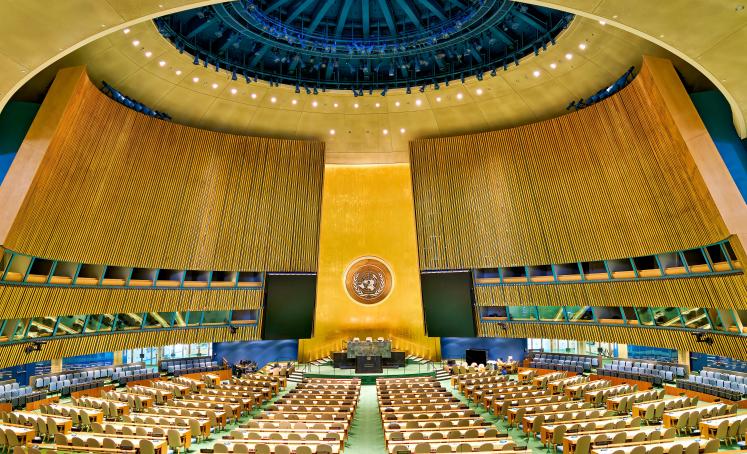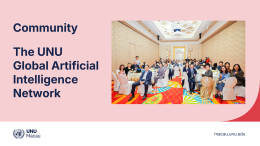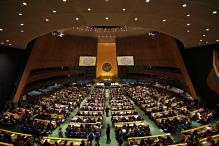As world leaders gather in New York City for United Nations General Assembly High-Level Week, UNU-CPR continues to engage and support States as they initiate critical discussions on the future of multilateralism – providing an evidence base to accelerate the Sustainable Development Goals (SDGs), reform the international financial architecture, and strengthen peace and security and the governance of Artificial Intelligence (AI).
This year’s High-Level Week carries particular significance as it marks the 80th anniversary of the United Nations. Leaders will reflect on eight decades of multilateralism while charting a path forward under the theme “Better Together: 80 Years and More for Peace, Development and Human Rights.” The agenda features a High-Level Meeting commemorating UN80, the annual SDG Moment, and a series of leader-level debates and bilateral meetings that will help shape the global policy landscape and the future of the UN.
Renewing multilateralism at UN80
The UN80 commemoration is expected to spotlight how the international system can become more inclusive, effective and accountable. UNU-CPR’s work on implementing the Pact for the Future provides practical pathways to achieve these aims. Building on its support to the High-Level Advisory Board on Effective Multilateralism, UNU-CPR has published analysis outlining concrete institutional reforms in global governance, financing and digital cooperation. These proposals can help Member States move from broad commitments to actionable solutions.
More recently, UNU-CPR researchers have contributed valuable insights and perspectives to help shape the UN80 reform initiative as it continues to evolve, arguing that UN80 should move beyond the language of crisis, reframe conversations about the organization’s future to support transformative, sustained reform, and focus on "long problems" and "doing better with less". A podcast also assesses how the UN can respond to calls for reform – and become more agile, efficient and responsive to global challenges.
Financing the SDGs and reforming the global financial architecture
Development cooperation and finance is another core focus, following the recent Fourth International Conference on Financing for Development (FFD4). Leaders will think through how to unlock investment for the SDGs while addressing unsustainable debt burdens and aligning climate and development finance. A recent blog identifies takeaways from FFD4 and how the multilateral system can deliver for people, planet, peace and prosperity; and a side event to the First Biennial Summit for a Sustainable, Inclusive and Resilient Global Economy will hold a high-level roundtable with public, private sector and philanthropic leaders on development cooperation through a ‘Positive Economic Statecraft’ lens.
A discussion paper with the Penn International Climate Observatory will also call for a “full-spectrum approach” to climate finance – fiscal, monetary and regulatory tools working together in nationally-led systems that can make climate investments more affordable, more stable and more attractive to long-term investors. And a recent commentary explains how digital finance can act as an enabler of economic growth, resilience and inclusion.
Foundations for a Multilateral Sovereign Debt Mechanism, published during FFD4, sets out options to make debt restructuring faster, fairer and more predictable – critically important at a time when 3.3 billion people live in countries where interest payments exceed public spending on either health or education. Other recent papers have explored how to regear the international trade system to deliver a sustainable future and the implications of international financial reform for fragile and conflict-affected States. The positions advanced in another, on moving beyond GDP as a benchmark for measuring human and planetary well-being, will also be shared in an event we are cosponsoring with members of the Secretary-General’s Expert Group this week.
Finally, ahead of the SDG Moment, a recent UNU-CPR podcast considers why we are falling behind on delivery of the SDGs and what we now need to do to accelerate implementation.
Advancing peace and security
Peace and security concerns will also feature prominently during HLW debates. Within the context of the UN80 reform initiative and reflecting heightened geopolitical tensions and declining support and resources for peace operations, UNU-CPR recently published a discussion paper that called for a return to “essential peacekeeping” – a more viable and effective approach to peacekeeping that involves clearer and more limited mandates, tasks and support structures.
As the 80th session of the General Assembly gets underway, UNU-CPR recently updated its Assembly for Peace digital handbook which looks at the General Assembly’s past practice on peace and security and recommends how the body can play a more active role in peace and security and foster deeper interactions with the Security Council.
Shaping global AI governance
Finally, the governance of AI has emerged as a flagship theme during High-Level Week, with the launch of the Global Dialogue on AI Governance and quickly following the announcement of an International Scientific Panel on AI (ISP-AI). As Member States deliberate on the future of AI and how to balance risks with the opportunities this rapidly evolving technology offers, UNU-CPR continues to explore the ethics, safety and equity issues associated with AI.
A recent blog suggests how the United Nations can best approach the issue of AI risk. Offering recommendations to guide the work of the ISP-AI, the article analyses the UN’s long history of monitoring risk and identifies four approaches the organization can consider as it attempts to influence and shape our digital future.




